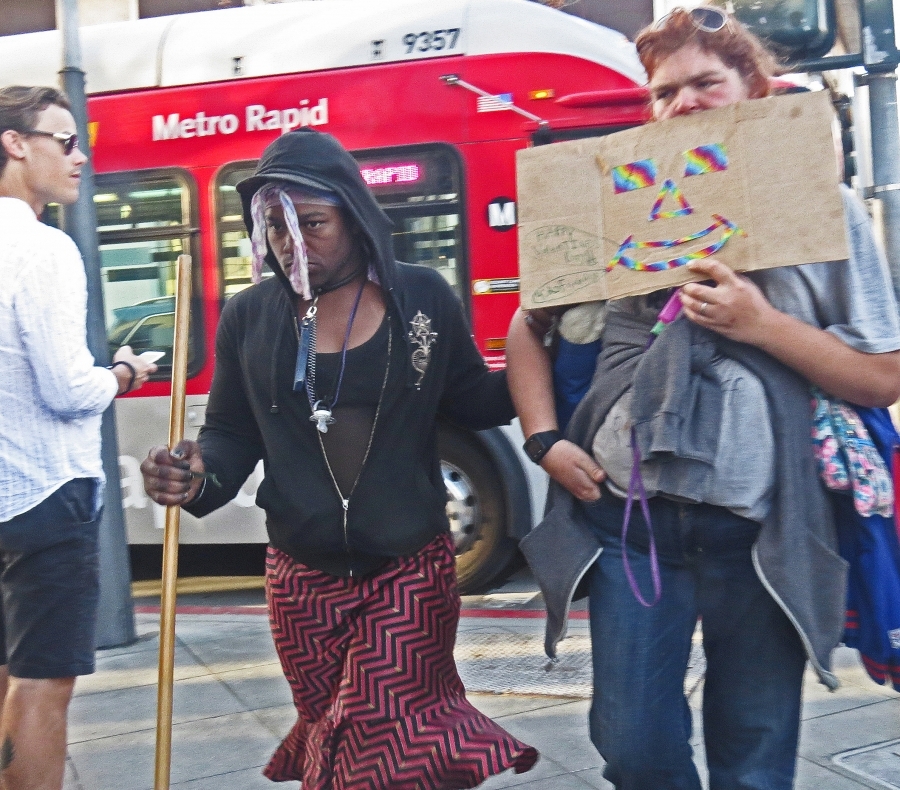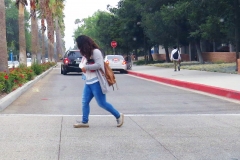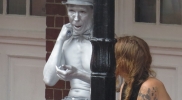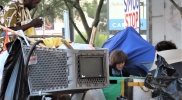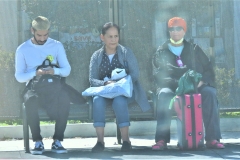|
|
Best Trivia - Music
|
Favorite Trivia – CRIME & PUNISHMENT
|
| “… Eiko and I walked the dozen or so blocks to her apartment… ‘How is your mother?’ I asked.
She said, ‘Mom is well. Eighty-two now. She came to see me. She liked Amsterdam very much but she worried about me walking in narrow streets. She has a friend whose son, ten years ago, took his bride on a honeymoon in Paris. They walked in a narrow street, found a small boutique, went in. Bride found dress she wanted to try on. Man took her in back to dressing room. Told husband to wait. Bride didn’t come out, didn’t come out. Finally husband went to look. No one there. He went to police and to embassy. Never found her, suspect she in harem somewhere Middle East now. Embassy never tell public these things.’” [February 26, 1998]
Eleanor Coppola – Notes On A Life
|
|
Customer: “Do you have security cameras in here?”
Bookseller: “Yes.”
Customer: “Oh.” (Customer slides a book out from inside his jacket and places it back on the shelf)
Jen Campbell – Weird Things Customers Say in Bookstores
|
| “I was with Mwalimu when he got into a fender bender with a reckless-driving government official, and had to go to the police station. There he was informed that the accident was being judged his fault.
“‘How could that be?'” he asked.
“‘It would never have happened if you had not come into the country,’ the policeman said.”
“The Road is Very Unfair” – Ted Conover (Literary Journalism, editors: Sims and Kramer)
|
| “The Book of Daniel. It is the well-known story of Susannah and the two elders. These men, who were judges and who were respected by the master of the house, fell in love with the beauty of his wife. One afternoon they hid in the garden to watch her taking a bath. She refused them her favours and in revenge they said they had seen her lying with a young man. They were believed and Susannah was condemned to death. But Daniel, still a youth, saved her by questioning the two judges separately—their evidence was contradictory, and it was they who were sentenced to death.”
Simone de Beauvoir – The Coming of Age (trans. by Patrick O’Brian)
|
| “Beasley was turned into the bullpen with other nightshade denizens who’d run afoul of the law… Beasley judged he could keep himself entertained for a day or two just reading the tattoos.”
“Sugarbaby” (I Hate To See That Evning Sun Go Down – William Gay)
|
| “The old expression is ‘shoot to kill,’ but Chon shoots to wound. Not out of some humanitarian concern—fuck that—but when you’re outnumbered, wounding the enemy can be more effective than killing him, because at least one of his buddies has to tend to him, taking two men out of action instead of one.”
“Paradise” (Don Winslow – Broken)
|
| “Every judge who has been bribed weighs truth badly.” [Satires, II, II.]
Horace: Satires, Epistles and Ars Poetica, trans. by H. Ruston Fairclough
|
| “I’m going to write down something very sad that happened yesterday at grandma’s. Since the days of slavery the Negro workmen at the chácara have all been black, and I don’t know why one of them turned out to be white and pretty. Her name is Florisbela but we call her just Bela. She married a Negro who is so ugly it breaks your heart. On the day of the wedding there was a table of sweets and it was painful to see Bela, coitada, sitting there beside the bridegroom. Marciano is the most highly respected Negro at the chácara. He learned the trade of blacksmith and he comes into the parlor to pay his respects to grandma and my aunts. Even so I didn’t want Bela to marry him.. She is really so pretty! She looks like a rose camellia, light, rosy, and with beautiful teeth… Grandma is always complaining that the law of the 13th of May set everybody free except her, because she was left with a houseful of Negro women, and babies, and old men. She’s very pleased when any of them get married… Bela was the last one, and now she is so unlucky!
“Today Marciano with a friend helping him, carried her in in a hammock. When he started to lift Bela out of the hammock we were all horrified and started to scream, and he said, ‘No, she isn’t dead.’ She was half-dead, half-alive. They only knew she was alive because when they held a mirror in front of her mouth it clouded over… Marciano told us what had happened. He said that a friend who shared his house and took his meals with him was jealous when he saw him married to Bela, so light and pretty, and he wanted to run away with her. Because she wouldn’t do it he brought her a bottle of wine he’d prepared, and when she drank it she fell down as if she were dead. Marciano waited in Formação for a day to see if she would come to, but then he lost hope and brought her here. He stays sitting beside her, watching her and crying…
“I asked Marciano if no one could do anything to make her wake up and he said that only the villain who did the deed could undo it. But that fiend has already told his friends that even in death he’ll never tell what he did; and that he’d rather die and go to the depths of hell than see Bela married to Marciano! Marciano is so good that he only keeps saying, ‘I didn’t deserve such an angel. God gave her to me and God is taking her away.'” [February 16-17, 1894]
Alice Dayrell Caldeira Brant – The Diary of “Helena Morley”
|
| “… he was at the prison gate, and in another moment was at liberty… Each step he took, each face or object that he knew, helped at once to link him on to the life he had led before his imprisonment, and at the same time to make him feel how completely that imprisonment had cut his life into two parts, the one of which could bear no resemblance to the other.”
Samuel Butler – The Way of All Flesh
|
| When the Japanese captain could not provide his prisoner of war’s dying request—a bottle of beer [and a black Leghorn chicken]—he could not “show Bushido by granting the man’s drying wish. Therefore the Australian could not be allowed to die, or he himself would be disgraced.”
Nevil Shute – A Town Like Alice
|
| “A man is up in court for embezzlement and spends his entire trial desperately protesting his innocence. Eventually the jury find him not guilty and he turns with a look of joy and relief to the judge.
‘Thank you so much, your honour!’ he says ‘So does this mean I can keep the money?'”
|
| “Mario told me of a hotel in which he had been, where a chambermaid stole a priceless diamond ring from an American lady. For days the staff were searched as they left work, and two detectives searched the hotel from top to bottom, but the ring was never found. The chambermaid had a lover in the bakery, and he had baked the ring into a roll, where it lay unsuspected until the search was over.”
George Orwell – Down and Out in Paris and London
|
| “Philadelphia, a Conference on Battered Women: I listen to a young mother, wearing dark glasses, describe her husband’s pattern of abuse. ‘Whenever I’d get pregnant he’d go for my stomach, kick me there, forget about my face…’
“I can’t believe what I’m hearing. Of course, it’s true. I’ve read the reports, the statistics, the interviews. I’m here to give a speech on the ‘phenomenon.’ I listen hunched over, hiding my belly with my whole upper body. I think: Not all men, only a few men; the psychopaths, the exceptions.
“A second woman describes how her two sons beat her up regularly, for money. A third says it was her adolescent daughter who terrified her and then began to hit her. A fourth woman describes how the police always believed her husband. A fifth woman weeps because her family blamed her for not being able to control her husband’s violence. A sixth woman explains that her husband’s family warned her that if she left him he’d kill himself for sure, her kids would be orphans, and that they’d all turn their backs on the ‘whole mess.’ On and on the women bear witness to their extraordinary powerlessness: their loyalty to their children no matter what.” [June 16, 1977]
Phyllis Chester – With Child: A Diary of Motherhood
|
| “blackmail: A shush fund.”
Leonard Louis Levinson – Webster’s Unafraid Dictionary: Defiant Definitive Put-Downs
|
| “Lou knows that there are two ways to solve a crime:
1. A snitch.
Someone talks.
You can do all the CSI razzmatazz you want—that voodoo is for juries—but most crimes are solved because someone yaps.
2. Patterns.
With a serial criminal, unless you get a snitch, this is the ball game. A smart criminal can leave only minimal clues, but he can’t help leaving patterns, any more than you can help leaving footprints on the beach.”
“Crime 101” (Don Winslow – Broken)
|
| “Terry Melcher, son of Doris Day and producer of the Byrd’s Untitled, who was the intended victim. (Manson an aspiring singer-songwriter, was introduced to Melcher by Beach Boy Dennis Wilson, at whose house he and a few of his women had crashed for several months in the summer of ’68 and he blamed Melcher when he failed to secure a recording contract. Melcher and Melcher’s girlfriend, actress Candice Bergen, had been the tenant of Cielo Drive before Polanski and Tate) . . . Cielo Drive looked like an act of random, senseless violence, but it wasn’t. It was a Greek tragedy.”
Lili Anolik – Hollywood’s Eve: Eve Babitz and the Secret History of L.A.
|
| “‘I have come,’ said Benjamin [author’s brother], ‘to tell you good by. I am going away.’
“I inquired where.
“‘To the north,’ he replied…
“I told him he might be caught and brought back; and that was terrible to think of. “
He grew vexed, and asked if poverty and hardships with freedom, were not preferable to our treatment in slavery. ‘Linda,’ he continued, ‘we are dogs here; foot-balls, cattle, every thing that’s mean. No, I will not stay. Let them bring me back. We don’t die but once.'”
Linda Brent – Incidents in the Life of a Slave Girl
|
| “A man is jumped by two muggers. The muggers try to pin him down but he fights like a wildcat. In the end it takes half an hour of tussling for them to overpower him and take out his wallet. Inside they find just 57 pence. ‘What the hell is this?’ says one of the muggers. ‘You fought like that for just 57p?’
‘Of course not,’ says the man. ‘I thought you were after the two hundred quid I’ve got hidden in my shoe!'”
|
| “Nasrudin is going across the border with a donkey carrying bundles of straw on its back. The border guard stops Nasrudin and asks him his business.
‘I’m a smuggler!’ Nasrudin replies bluntly.
The guard narrows his eyes. He searches through every single one of the bundles of straw that Nasrudin is taking across the border but he can’t find anything and so has to let Nasrudin pass by. The next day Nasrudin is back with his donkey laden with yet more bundles of straw. Again the border guard searches thoroughly through the straw. Again he cannot find anything and again he has to let Nasrudin pass by.
This pattern happens every day for several years during which time the guard begins to notice that Nasrudin is looking gradually wealthier and better dressed. Yet no matter how hard he searches, he cannot find what Nasrudin is smuggling.
Many years later when they are both old men, long after they have retired, the guard bumps into Nasrudin in the market place. ‘OK, Nasrudin,’ says the guard, ‘you can tell me now! Just what was it you were smuggling all those years?’
‘Donkeys!’ says Nasrudin.” |
| “I went forth into the darkness and rain. I ran on till I came to the house of the friend who was to conceal me.
“Early the next morning Mr. Flint was at my grandmother’s inquiring for me. She told him she had not seen me, and supposed I was at the plantation… The next day was spent in searching. Before night, the following advertisement was posted at every corner, and in every public place for miles round:—
“$300 REWARD! Ran away from the subscriber, an intelligent, bright, mulatto girl, named Linda, 21 years of age. Five feet four inches high. Dark eyes, and black hair inclined to curl; but it can be made straight. Has a decayed spot on a front tooth. She can read and write, and in all probability will try to get to the Free States. All persons are forbidden, under penalty of the law, to harbor or employ said slave. $150 will be given to whoever takes her in the state, and $300 if taken out of the state and delivered to me, or lodged in jail.”
Linda Brent – Incidents in the Life of a Slave Girl
|
| “One day, when I had been requested to do an errand for Mrs. Bruce, I was hurrying through back streets, as usual, when I saw a young man approaching, whose face was familiar to me. As he came nearer, I recognized Luke. I always rejoiced to see or hear of any one who had escaped from the black pit; but, remembering this poor fellow’s extreme hardships, I was peculiarly glad to see him on Northern soil, though I no longer called it free soil… At first, he did not know me; but when I mentioned my name, he remembered all about me. I told him of the Fugitive Slave Law, and asked him if he did not know that New York was a city of kidnappers.
“He replied, ‘De risk ain’t so bad for me, as ’tis fur you. ‘Cause I runned away from de speculator, and you runned away from de massa. Dem speculators vont spen dar money to come here fur a runaway, if dey ain’t sartin sure to put dar hans right on him. An I tell you I’s tuk good car ’bout dat. I had too hard times down dar, to let ’em ketch dis nigger.’
“He then told me of the advice he had received, and the plans he had laid. I asked if he had money enough to take him to Canada. ”Pend upon it, I hab,’ he replied. ‘I tuk car fur dat. I’d bin workin all my days fur dem cussed whites, an got no pay but kicks and cuffs. So I tought dis nigger had a right to money nuff to bring him to de Free States. Massa Henry he lib till ebery body vish him dead; an ven he did die, I knowed de debbil would hab him, an vouldn’t vant him to bring his money ‘long too. So I tuk some of his bills, and put ’em in de pocket of his ole trousers. An ven he was buried, dis nigger ask fur dem ole trousers, an dey gub ’em to me.’ With a a low, chuckling laugh, he added, ‘You see I didn’t steal it; dey gub it to me. I tell you, I had mighty hard time to keep de speculator from findin it; but he didn’t git it.'”
Linda Brent – Incidents in the Life of a Slave Girl
|
| “Other miserable men when they are thrown into prison, if they are robbed of the beauty of the world, are at least safe in some measure from the world’s most deadly slings, most awful arrows. They can hide in the darkness of their cells and of their very disgrace make a mode of sanctuary. The world having had its will goes its way, and they are left to suffer undisturbed. With me it has been different. Sorrow after sorrow has come beating at the prison doors in search of me; they have opened the gates wide and let them in. Hardly if at all have my friends been suffered to see me. But my enemies have had full access to me always; twice in my public appearances in the Bankruptcy Court; twice again in my public transferences from one prison to another have I been shown under conditions of unspeakable humiliation to the gaze and mockery of men…
“I am at once taunted and threatened with poverty. That I can bear. I can school myself to worse than that; but my two children are taken from me by legal procedure. This is, and always will remain to me a source of infinite distress, of infinite pain, of grief without end or limit. That the law should decide and take upon itself to decide that I am one unfit to be with my children is something quite horrible to me. The disgrace of prison is as nothing compared with it.”
Oscar Wilde – De Profundis
|
| “… one day I found out about sex without asking any questions. I was almost nine, and I lived with a family that rented a room to a man named Kimmel. He was a stern looking man, and everybody respected him and called him Mr. Kimmel. I was passing his room when his door opened and he said quietly, ‘Please come in here, Norma.’
I thought he wanted me to run an errand. ‘Where do you want me to go, Mr. Kimmel?’ I asked. ‘No place,’ he said and closed the door behind me. He smiled at me and turned the key in the lock. ‘Now you can’t get out,’ he said, as if we were playing a game. I stood staring at him.
I was frightened, but I didn’t dare yell. I knew if I yelled I would be sent back to the orphanage in disgrace again. Mr. Kimmel knew this, too. When he put his arms around me I kicked and fought as hard as I could, but I didn’t make ay sound. He was stronger than I was and wouldn’t let me go. He kept whispering to me to be a good girl. When he unlocked the door and let me out, I ran to tell my ‘aunt’ what Mr. Kimmel had done. ‘I want to tell you something,’ I stammered, ‘about Mr. Kimmel. He—he—’ My aunt interrupted. ‘Don’t you dare say anything against Mr. Kimmel,’ she said angrily. ‘Mr. Kimmel’s a fine man. He’s my star boarder.’
Mr. Kimmel came out of his room and stood in the doorway, smiling.
‘Shame on you!’ my ‘aunt’ glared at me, ‘complaining about people.’
‘This is different,’ I began, ‘This is something I have to tell. Mr. Kimmel—’ I started stammering again and couldn’t finish.
Mr. Kimmel came up to me and handed me a nickel. ‘Go buy yourself some ice cream,’ he said.
I threw the nickel in Mr. Kimmel’s face and ran out. I cried in bed that night and wanted to die. I thought, ‘If there’s nobody ever on my side that I can talk to I’ll start screaming.’ But I didn’t scream.”
Marilyn Monroe (with Ben Hecht) – My Story
|
| “After what seemed hours, Genaro hobbled out the door, hands cuffed behind his back, hat missing, face and shirt wet, clearly shaken. It was more than sweat—his shirt was soaked, and stuck to his chest. ‘Tehuacanazo,’ said Jesús, standing next to me. He was grim. Agua Tehuacán, I knew, was Mexico’s popular carbonated mineral water. Tehuacanazo, I would later learn, was the slang term for the torture, popular among the judicial police, which involved holding the seated victim’s head back, covering his mouth, and then pouring the fizzy water up his nose through which it entered his sinuses. The torture was so common and so ghastly that almost everyone in Mexico knew what Tehuacanazo meant.”
Ted Conover – Coyotes: A Journey through the Secret World of America’s Illegal Aliens
|
| “To the slave mother New Year’s day comes laden with peculiar sorrows. She sits on her cold cabin floor, watching the children who may all be torn from her the next morning… On one of these sale days, I saw a mother lead seven children to the auction-block. She knew that some of them would be taken from her; but they took all. The children were sold to a slave-trader, and their mother was bought by a man in her own town. Before night her children were all far away. She begged the trader to tell her where he intended to take them; this he refused to do. How could he, when he knew he would sell them, one by one, wherever he could command the highest price? I met the mother on the street, and her wild, haggard face lives to-day in my mind. She wrung her hands in anguish, and exclaimed, ‘Gone! All gone. Why don’t God kill me?'”
Linda Brent – Incidents in the Life of a Slave Girl
|
| “Near the school* was Green Briar Park where we played basketball. It was also the hangout for a gang called the Popes, as well as for a local drug dealer named Ted Light . . . Ted owned a crossbow and he used it to shoot small animals climbing telephone poles in his alley. One day Ted and a twenty-seven-year-old car thief named Dwight Lambert drove toward the lake, then south, past the fancy buildings in Lincoln Park. They took the ramp near the river . . .
“Ted spotted a homeless man in a loading dock, sleeping on his left side on top of a cardboard box. Dwight idled the car while Ted pulled on a pair of leather gloves, slid a serrated razor-tipped arrow into the bow, aimed from the window, and shot the man in the heart. The man flipped onto his back, mouth wide, gasping for air as his heart seized and his body released his ghost. The two men waited, like children at an aquarium, watching him die before Ted took off his gloves, stored the crossbow, and drove away . . .” [Four years later, Ted Light was sentenced to 60 years in prison for murdering Gaylord Tolbert]
*CSC, the special school for group home kids and children with behavior disorders that Elliott attended when he was 15.
Stephen Elliott – The Adderall Diaries
|
| “… one day I received word from the studio that I had forty dollars coming to me. I hurried over and collected it. The cashier handed me a check for the money. I was so excited I left the studio forgetting to cash it… I tried to cash the check in different places. Nobody would cash it.
I saw a policeman looking up at me, so I went up to him. ‘Pardon me, officer,’ I said. ‘Could you help me please? I want to get a check cashed, and I don’t know where.’ He smiled and said, ‘Well, that is a serious predicament. Come along, I’ll see what I can do. What sort of a check is it?’
‘It’s a payroll check,’ I said, ‘from the 20th Century Fox studio…’ The policeman took me into a store. He spoke to the manager who agreed to cash the check… The manager brought the check back and said, ‘Would you mind putting your name and address on the back of this? I did… After my shopping, I stopped in a doctor’s office. I had a cold… I went to bed early… I’d been sleeping for a few hours when a nose woke me. I’d never heard this sort of noise before, but I knew what it was. Somebody was cutting the screen of the bedroom window.
I jumped out of bed and ran out of the house. I went around the side to look. A man was starting to climb into my bedroom window. I imitated a gruff male voice and called indignantly, ‘Hey, what are you doing there?’ The man pulled his head out of the window and looked toward me. ‘Get away from here,’ I shouted again in a gruff voice, ‘or I’ll call the police.’ The man started toward me. I turned and ran like sixty. It was around midnight. I ran down the deserted suburban street. I was barefooted, and I was wearing the new style of half nightgown. It came just a little below the waist.
I arrived at a neighbor’s house and yelled. He came down with his wife behind him. She started yelling when she saw me. I explained about the man trying to break into my bedroom and asked the neighbor to go capture him. The neighbor shook his head. ‘The fellow probably has a gun,’ he said. ‘Burglars usually carry them.’
‘He’s not a burglar,’ I said. ‘He was after me.’ I telephoned the police and covered myself with a quilt. The police took an hour to arrive. I went back to the house with them. They found the cut screen and footprints and everything.
‘Well, you scared him off’ the detective said. ‘You have nothing to worry about. You can go back to bed.’ ‘But what if he returns?’ I asked. ‘Never happens,’ said the detective. ‘Once a burglar is scared off the premises he’ll never return to that place. Just relax, miss, and go to sleep. We’ll let you know if anything turns up.’
There was a loud knocking on the door. I jumped two feet. It was around 1 a.m. ‘Do you usually get company at this time of night? The detective asked me. ‘No,’ I said. ‘I never have any company… ‘Go open the door,’ the detective ordered. I went to the door and opened it. It was the screen cutter. He made a grab for me, and I screamed. The two detectives seized him. ‘That’s the man,’ I yelled. ‘He’s the burglar!’
‘What’s all this?’ the man scowled at the detectives holding him. ‘Marilyn’s an old friend. Good old Marilyn.’ And he winked at me and said, ‘Tell ‘em, honey.’
‘I don’t know the man,’ I said. ‘He looks a little familiar, but I don’t know him.’
‘Let me go,’ the man cried. ‘You can’t arrest somebody for calling on an old friend.’
‘How about it?’ one of the detectives said to me. ‘Let’s have the truth, Miss Monroe. Is this an old sweetie of yours?’
I could feel that they were believing the man, and I was terrified they would go away and leave him alone with me.
‘He’s no burglar,’ the detective scowled at me. ‘He knows your name and address. He comes back after you chase him away. Obviously he’s—’
The other detective was searching the man and pulled a revolver out of his pocket. “Hey,’ he interrupted, ‘this is a police gun! Where’d you get this?’
At the words ‘police gun’ I knew who the man was. It was the policeman with the eyes close together who had helped me cash my forty dollar check. He’d memorized the name and address as I wrote them on the back of the check.
I hadn’t recognized him at first because he was out of uniform. I told the detectives who he was. He denied it but they found a Los Angeles police card in his pocket.
They took him away.
The next day the detectives visited me. They told me the man was a new cop, that he was married and had a fourteen-month-old baby. They said they would rather I didn’t file any charges against the man because it would give the police force a black eye.
‘I don’t want to punish him,’ I said, ‘but I would like to be sure he didn’t try to do that to me again. Or to any other girl.’
The detectives assured me he wouldn’t. So I didn’t file any charges. Instead I moved out.”
Marilyn Monroe (with Ben Hecht) – My Story
|
| “The boys [Dylan Klebold and Eric Harris] went to reload their weapons at a table. Eric noticed John Savage, a boy Dylan knew. John asked Dylan what they were doing, and he said, ‘Oh, just killing people.’ John asked if they were going to kill him. Dylan told him to leave. John fled.”
Sue Klebold – A Mother’s Reckoning: Living in the Aftermath of Tragedy
|
| The Man Behind The Shower Curtain
“He’s our devil in decaying armor, the modern day cannibal, the suspect neighbor, the psycho Santa, the prank caller, the bad cop, the slow-passing car, the 4:00 AM phone call, the disguised cableman, the shadow at the end of the hall, the man on the corner, the man in the alley, the man behind you, the too-friendly landlord, the noise you can’t trace, the armed intruder, the unarmed intruder, the gut felling, the unrecognizable knock, the unashamed eye contact, the uncomfortable silence, the lone swinger in the park, the suit-and-tie man watching on the beach, the touchy priest, the slow-working house painter, the all-too-regular customer, the pushy date, the dark shaded flasher, the soft-spoken child molester, the eyes at the window, the man lying in the back seat of your car, the Boogie man, the one walking in your attic, the unlocked door, the ransacked apartment, the disconnected phone, the fear in your own home, the unfunny clown, the chummy drunk, the coach you couldn’t trust, the two-faced stepfather, the jogger following your path, the stranger who knows your name.”
Julie Mullany
|
| “I remember the first time I was punished. It was in the month of February. My grandmother had taken my old shoes, and replaced them with a new pair. I needed them; for several inches of snow had fallen, and it still continued to fall. When I walked through Mrs. Flint’s room, their creaking grated harshly on her refined nerves. She called me to her, and asked what I had about me that made such a horrid noise. I told her it was my new shoes. ‘Take them off,’ she said; ‘and if you put them on again, I’ll throw them into the fire.
“I took them off, and my stockings, also. She then sent me a long distance, on an errand. As I went through the snow, my bare feet tingled. That night I was very hoarse; and I went to bed thinking the next day would find me sick, perhaps dead. What was my grief on waking to find myself quote well!”
Linda Brent – Incidents in the Life of a Slave Girl
|
| “A few years past, the mainland [Hawaiian] mafia sent a couple of hit men from Las Vegas to muscle in on the Company’s turf. The story goes that the Company chopped the two wiseguys into pieces and FedExed them back to Vegas with a note that read ‘Delicious, send more.'”
“Paradise” (Don Winslow – Broken)
|
| “Davis sits at the wheel of a black Shelby GT500 Mustang hardtop with a rear spoiler, Gurney flap, 550 HP and 510 ft.-lb. of torque.
“Crime 101: When you need to get away, you need to do it fast . . .
“Crime 101: Laws are made to be broken, with rules that are made to be followed . . .
“Crime 101: ‘Trust’ is a word generally used by convicts and usually in the past tense, i.e., ‘I trusted him’ . . .
“Crime 101: There’s a word for a man who believes in coincidence: the defendant . . .
“Crime 101: Never be predictable . . .
“Crime 101: Always have a backup . . .
“Crime 101: Everyone has a price . . .
“Crime 101: If you can get away, get away . . . “
“Crime 101” (Don Winslow – Broken)
|

Comments are closed.
|
|

















